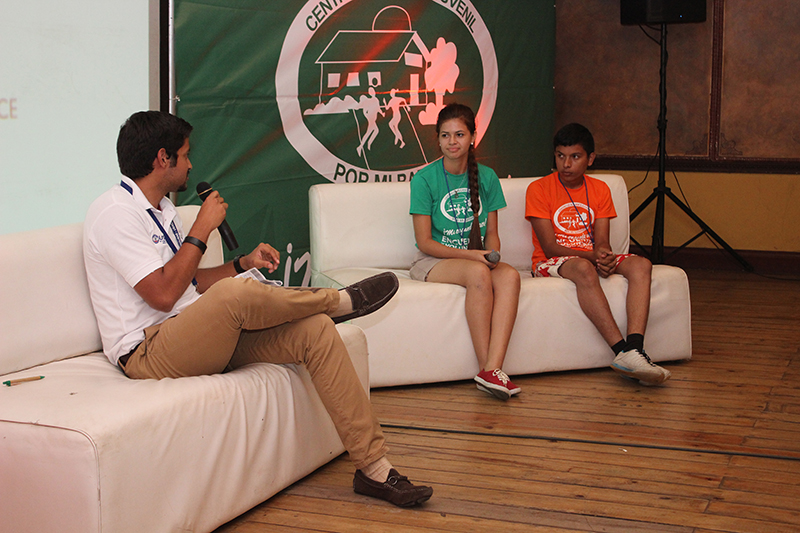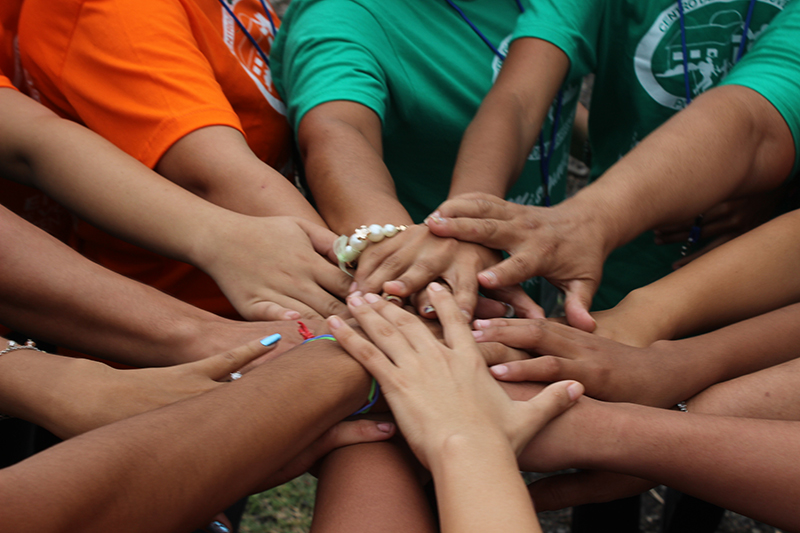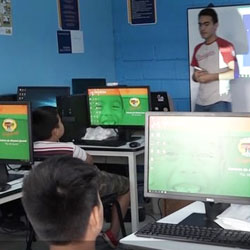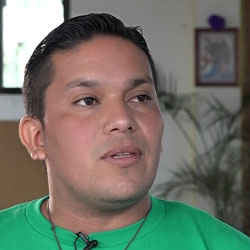Mais do que 400 voluntários com Aliança Juvenil Honduras-USAID estão trazendo energia renovada e lições aprendidas de volta aos jovens que servem em alguns dos mais de alto risco do país, áreas afetadas pelo crime.
Em quatro retiros realizados em cidades em todo o país, Os voluntários participaram de treinamentos e exercícios em desenvolvimento de liderança, empreendedorismo, Equipe e muito mais para melhorar sua implementação de atividades de prevenção de violência para jovens em risco em mais de 46 vizinhança Centros de divulgação.

Esses centros de extensão fazem parte do programa Alianza Joven Honduras-Usaid, que suporta Iniciativas de prevenção à violência baseada na comunidade De centros de extensão juvenil a comitês de prevenção de violência municipal em parceria com comunidades locais, o governo hondurenho e os EUA. Agência para o Desenvolvimento Internacional.
Reunindo voluntários e aprimorando suas habilidades, o programa, que é implementado pela Creative Associates International, Ajuda a reforçar um quadro de líderes locais para alcançar milhares de jovens em áreas de alto risco com orientação e mensagens positivas de resolução de conflitos não-violentos e empoderamento da juventude.
“O voluntariado é a espinha dorsal dos centros de extensão, como é um elemento indispensável e valioso deste modelo de prevenção de violência. Para operar adequadamente, Todos os centros de extensão devem ter as pessoas certas liderando os diferentes componentes, garantindo que uma ampla gama de serviços de prevenção seja oferecida aos jovens nessas comunidades,”Diz Yolanda Torres, que trabalha para Alianza Joven Honduras-USAid como coordenador de voluntários.
Os retiros também coincidem com o lançamento do sistema de voluntários de 5 estrelas do programa-projetado para reconhecer voluntários por contribuições excelentes ao crime juvenil e à prevenção da violência e mostrar as habilidades e competências que obtiveram através de seu voluntariado.
Para jovens em risco, Os voluntários oferecem uma tábua de vida a oportunidades alternativas de educação, recreação, Crescimento pessoal e treinamento de habilidades no trabalho, fora das ruas e longe da violência de gangues. Coletivamente, Eles estão ajudando a expandir a oportunidade e a esperar para os jovens nos bairros mais violentos de Honduras.
“Meu bairro era conhecido como um dos mais perigosos da cidade. Eu acredito que isso mudou por causa do meu voluntariado e também por causa dos meus colegas voluntários," diz, Gerson Garcia, Um voluntador no primeiro centro de extensão de maio em La Ceiba. "Ajudamos muitos jovens a descobrir um estilo de vida longe das gangues. É possível. "
Juntando -se a um movimento nacional de voluntários

Desde a aprovação da lei de voluntariado hondurenho em 2011, Houve um crescente reconhecimento em uma escala nacional do valor do voluntariado para enfrentar os desafios sociais, Como crime e violência. Nos quatro retiros, Os voluntários participaram de workshops para saber mais sobre seu direito e deveres de acordo com a lei.
Há também uma crescente coalizão nacional trabalhando para fortalecer as organizações baseadas em voluntários como um meio de desenvolvimento sustentável em Honduras, Chamado de Rede Voluntária de Honduras. Como um programa apoiado por milhares de voluntários em dezenas de comunidades, A Rede de Centro de Extenção de Alacateria, que inclui mais de 40 organizações.
Inspiração renovada para voluntários
Trabalhando em algumas das comunidades mais afetadas e empobrecidas do país, Os voluntários do centro de extensão enfrentam um número incontável de desafios.
Os voluntários, a maioria dos quais é das mesmas comunidades que os jovens que eles servem, Conheça bem as dificuldades da vida - a pobreza, violência, pressão dos colegas, uma família transnacional e mais. Para muitos, Suas próprias experiências os levaram a agir.
“Decidi me tornar um voluntário do centro de extensão porque desejo ver uma mudança para minha comunidade. Como adulto, Eu reflito sobre como minha vida teria acabado se os centros de extensão trabalhassem na minha comunidade quando eu estivesse 11 ou 12 ”anos, diz Maura Rivas, um voluntário no El Bufalo Outreach Center em La Ceiba. “Um centro de extensão oferece a oportunidade de o desenvolvimento, tanto para voluntários quanto beneficiários. Os voluntários podem compartilhar os presentes que Deus lhes concedeu, Embora os beneficiários possam descobrir um novo estilo de vida. ”
Para Rivas e seus colegas voluntários, Esses retiros fornecem um espaço muito necessário para ir além de suas próprias comunidades, e compartilhar histórias e lições aprendidas com voluntários de outras áreas.

Enquanto os voluntários podem enfrentar desafios semelhantes nas comunidades, Suas abordagens para superar essas podem variar e podem fornecer novas idéias valiosas, Como Yerlin Banegas, um voluntário no San Jose Outreach Center em San Pedro Sula, explica.
“Minha parte favorita de participar dessas reuniões é saber o que os voluntários de outras comunidades passam porque pode nos mostrar uma nova solução que podemos fazer em nosso centro de extensão. É uma experiência muito enriquecedora,”ela diz.
Por exemplo, Os voluntários podem aprender novas abordagens para alcançar jovens em risco que ainda não visitaram o centro de extensão. O recrutamento pode ser um dos maiores desafios para os voluntários, Explica David Medina, Vice-Chefe de Partido de Alianza Joven Honduras-USAid.
“Através desses retiros, os voluntários compartilham suas próprias maneiras de obter novos beneficiários usando métodos criativos e mídias sociais,”ele diz. "Após os retiros, os voluntários aplicam essas boas práticas e continuam compartilhando informações".
Para outros voluntários, Ouvir sobre os sucessos de outros centros de extensão proporcionou a inspiração e o incentivo necessários para aumentar os esforços de prevenção da violência em seus bairros.
“Quando havia a possibilidade de abrir um centro de extensão na minha comunidade, Eu pensei que não funcionaria,”Diz Karla Barnica, que tem voluntário no Lopez Arellano Outreach Center em Choloma desde que se abriu 2010.
Barnica diz que após seu primeiro retiro voluntário em 2011, Sua perspectiva mudou.
“Eu fui a reuniões como esta, Conversei com outros voluntários e percebeu que os centros de extensão mudaram vidas em outras comunidades e isso poderia acontecer na minha. ”
À medida que os voluntários retornam às suas comunidades dos retiros, Eles estão ansiosos para transmitir o conhecimento que adquiriram e aplicar novas perspectivas e técnicas a suas interações com jovens em risco.
“Eu pretendo me abrir mais com a juventude, compartilhar as experiências difíceis que passei para dar a eles uma idéia de como é a vida nas ruas. Precisamos mostrar a eles virtudes como o amor, compreensão e amizade. Deixamos esta reunião mais preparada e informada para desenvolver um papel melhor em nossas comunidades,”Diz Banegas.


